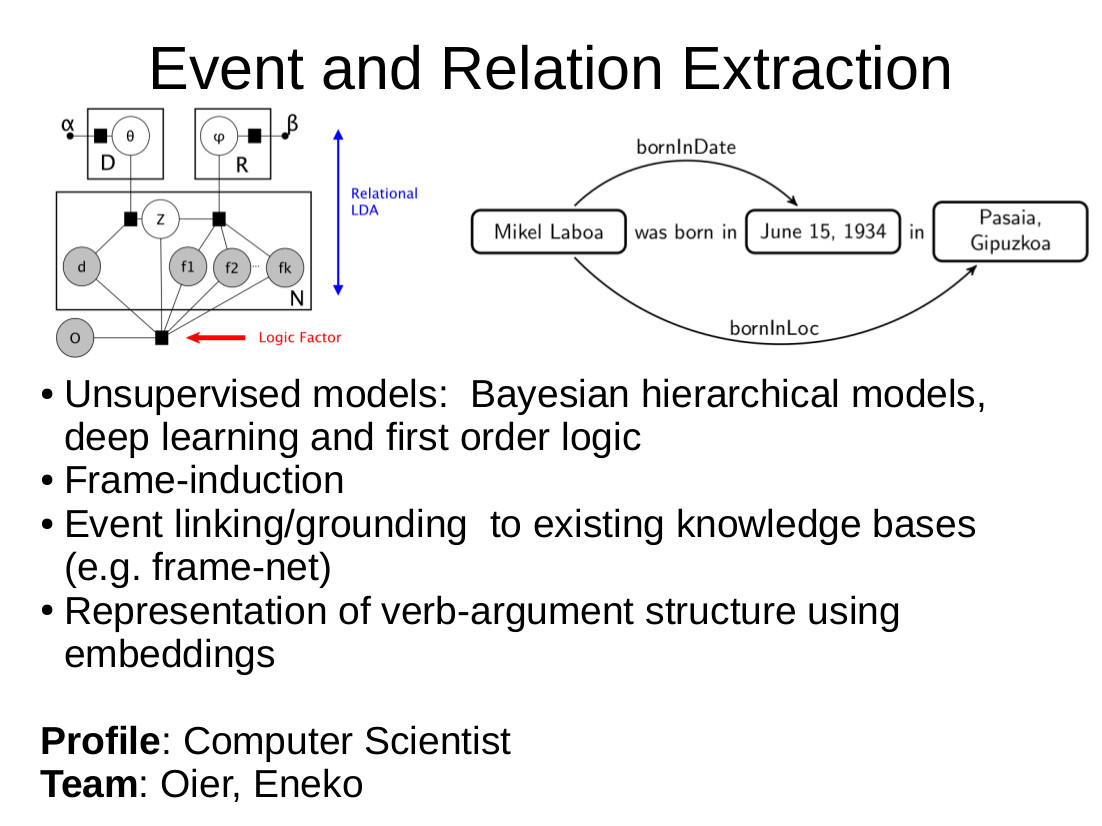Unsupervised Frame Induction for event and semantic relations.
keywords:
Unsupervised models, deep learning and first order logic, frame-induction, event linking/grounding to existing knowledge bases (e.g. frame-net), representation of verb-argument structure using embeddings
Description:
In natural-language discourse, related events tend to appear near each other to describe a larger scenario. Such structures can be formalized by the notion of a frame (a.k.a. template), which comprises a set of related events and prototypical participants and event transitions. Identifying frames is a prerequisite for information extraction and natural language generation, and is usually done manually. Methods for inducing frames have been proposed recently, but they typically use ad hoc procedures and are difficult to diagnose or extend.
The thesis will explore generalizable method that are able to learn semantic frames that explain the event and relation occurring in the text.
The thesis will explore generalizable method that are able to learn semantic frames that explain the event and relation occurring in the text.

Objectives:
The main objective of the thesis is to develop an unsupervised learning framework that is able to induce and extracts events occurring in texts. The model will be able to generalize over the instances of events by clustering/summarizing association of prototypical participants of events, and will define the relationship of events and participants. In addition the free modeling of events and relations, in a second step, extracted information will be grounded or linked to existing knowledge bases (e.g. FrameNet) in order to provide higher inference ability..
The student will mastered on topics like unsupervised models, hierarchical Bayesian models and deep learning. She also will learn to set up experiments, and evaluate NLP and Semantics motivated models.
The student will mastered on topics like unsupervised models, hierarchical Bayesian models and deep learning. She also will learn to set up experiments, and evaluate NLP and Semantics motivated models.
Task:
Review of the state of the art.
Problem formulation and formal definition of model that will be implemented.
Design of the evaluation framework.
Implementation and experiments.
Analysis of the results, and improvements of the model.
In principle all the task above are kept as general as possible as we foresee a learning-cycle in which tasks, models, and evaluations are updated for a improved research.
Problem formulation and formal definition of model that will be implemented.
Design of the evaluation framework.
Implementation and experiments.
Analysis of the results, and improvements of the model.
In principle all the task above are kept as general as possible as we foresee a learning-cycle in which tasks, models, and evaluations are updated for a improved research.
References:
Cosmin Bejan and Sanda Harabagiu. 2010. Unsupervised Event Coreference Resolution with Rich Linguistic Features. ACL 2010. https://aclweb.org/anthology/P/P10/P10-1143.pdf
Jackie Chi Kit Cheung, Hoifung Poon, Lucy Vanderwende. 2013. Probabilistic Frame Induction. arxiv. https://arxiv.org/pdf/1302.4813v1.pdf
Nathanael Chambers. 2010. Event Schema Induction with a Probabilistic Entity-Driven Model. EMNLP 2013. https://aclweb.org/anthology/D/D13/D13-1185.pdf
Jackie Chi Kit Cheung, Hoifung Poon, Lucy Vanderwende. 2013. Probabilistic Frame Induction. arxiv. https://arxiv.org/pdf/1302.4813v1.pdf
Nathanael Chambers. 2010. Event Schema Induction with a Probabilistic Entity-Driven Model. EMNLP 2013. https://aclweb.org/anthology/D/D13/D13-1185.pdf
Team:
Eneko Agirre, Oier Lopez de Lacalle
Profile:
Informatikaria
File:
contact:
oier.lopezdelacalle[abildua|at]ehu.eus
Date:
2017






